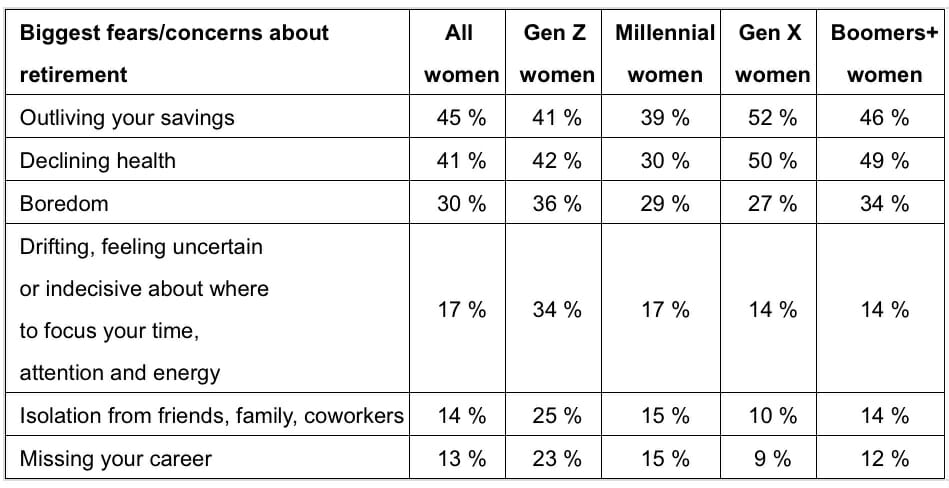Fewer women in America feel financially secure or confident in their retirement readiness than men, according to the latest findings from Northwestern Mutual’s 2023 Planning & Progress Study.
Just four in ten (43%) American women feel financially secure and 44% think they will be financially prepared for retirement. This compares to 59% of men who feel financially secure in their retirement readiness and 61% who think they will be financially prepared for retirement.
LEARN MORE; 3 Arizona cities rank among best places to stretch retirement money
“What our research tells us is that there is a gender gap in financial confidence,” said Tim Gerend, chief distribution officer at Northwestern Mutual. “The impact of inflation and the worries people have about recession and retirement are felt unevenly, but they are significant for both women and men. The bottom line is this: uncertainty about the future is cutting into confidence for many Americans, and that’s where a trusted advisor can help individuals build a plan to help them take control of their financial futures.”
More than 6 in 10 (63%) men in America believe Social Security will be there when they need it; meanwhile, less than half (48%) of women overall agree. Beyond the notable differences between women and men, the findings also reveal some interesting generational differences among women. Six in ten (63%) Boomer+ women are confident Social Security will be there when they need it – more than Gen Z women (48%), Millennials (39%) and Gen X (37%).
Retirement readiness
Gen Z women are more optimistic about their longevity and financial futures, but also stand out for what concerns them about life in retirement
According to the U.S. Centers for Disease Control and Prevention, the average lifespan of women in America is 79 – nearly six years longer than men. Moreover, the U.S. Census Bureau projects that the life expectancy rate for women will surpass 87 years by 2060.
According to Northwestern Mutual’s proprietary research, four in 10 (39%) Gen Z women and a third (32%) of Millennial women believe they’ll live to 100. That compares to 23% of Gen X and 20% of Boomers+.
Interestingly, nearly 6 in 10 Gen Z women (59%) believe they will be financially prepared for retirement – a significantly higher proportion than reported by women in other generations: Millennials (43%), Gen X (38%), and Boomers+ (48%).
Women’s greatest concerns about retirement align closely with those of men – outliving savings (45%), declining health (41%), and boredom (30%). But Gen Z women are significantly more concerned than their older female counterparts about isolation from friends, family and coworkers; missing their career; and drifting (i.e., feeling uncertain or indecisive about where to focus their time, attention and energy).
“The youngest women in our workforce seem to be tethering more of their identity and purpose in life to their relationships, interests and professional personas,” said Gerend. “Retirement can be amazing, but it can also be disruptive and challenging for someone who gets fulfilled from success at work. That’s why financial planning conversations with expert advisors aren’t just about investments and insurance; they’re also about the beloved people and causes that give our lives meaning and a purpose.”

“Planning for retirement is about more than just dollars and cents – it’s about making every single year count,” said Veronica Fuentes, CFP®, CLU®, ChFC®, CLF®, RICP®, a Northwestern Mutual managing director based in Washington, D.C. “I speak to my younger clients often about starting early, increasing retirement contributions each year and addressing risks to protect what they’ve already built. With the right lifestyle and choices in life, many in younger generations may live to age 100, so it’s exciting to see them consider what their ‘second act’ in retirement might look like. If Gen Z can get started with financial planning early, this will allow them the financial freedom and flexibility to figure out what they’ll do next without the added pressure.”
Gen Z and Millennial women say they need to get better at financial planning; Gen X and Boomers+ aim to pay down debt
Among women, younger generations are most inclined to say their financial planning needs improvement. While two-thirds (66%) of women overall think their financial plans need improvement, younger women are most inclined to agree: Gen Z (79%) and Millennial (76%).
“Our data disproves the old myth that ‘young people think they know everything,'” said Gerend. “When it comes to financial security, younger women are more likely to say that they could benefit from advice. Coming out of the pandemic, many young Americans saw why financial security is so important. Their passion for continuous improvement is a great sign for these generations and their financial futures.”
Younger generations of women are also more likely to prioritize saving over paying down debt than their older counterparts. Conversely, older generations of women are more likely to prioritize paying down debt over saving.

“It’s inspiring to see so many younger women committing to their dreams and the financial plans needed to fund them,” said Gerend. “Financial planning can be the catalyst – helping people to borrow less, save more, build wealth, address financial risks, and close the gender wealth gap in America.”
Gen X women are least likely to have a long-term financial plan, and most likely to say they won’t be financially ready for retirement
Nearly six in 10 women (58%) say they don’t have a long-term financial plan that factors for up and down economic cycles. For Gen X women, it’s two-thirds (67%). This is compared to 52% for Gen Z and Millennial women, and 57% for Boomers+ women.
Gen X women (38%) are also the least likely to say they will be financially prepared for retirement when the time comes.
“Gen X is ‘gen anxious,’ but there is still an opportunity for these women to build financial security if they act intentionally,” said Fuentes. “For anyone feeling like they are falling behind, it’s not too late for any woman to have a conversation with an advisor to understand the fastest and most reliable strategies to build and protect wealth. There are several risks in retirement that could derail a plan such as down markets, taxes, inflation, and health care costs. Working with a financial advisor can help women and men to achieve financial security. That’s our mission, and at Northwestern Mutual we are proactively working to make the advisor career more attractive than ever for women. Our company’s return-to-work and maternity benefits and our dedicated leadership and development programs are driving more women to choose the profession, and that’s good news for everyone seeking to build financial security.”




